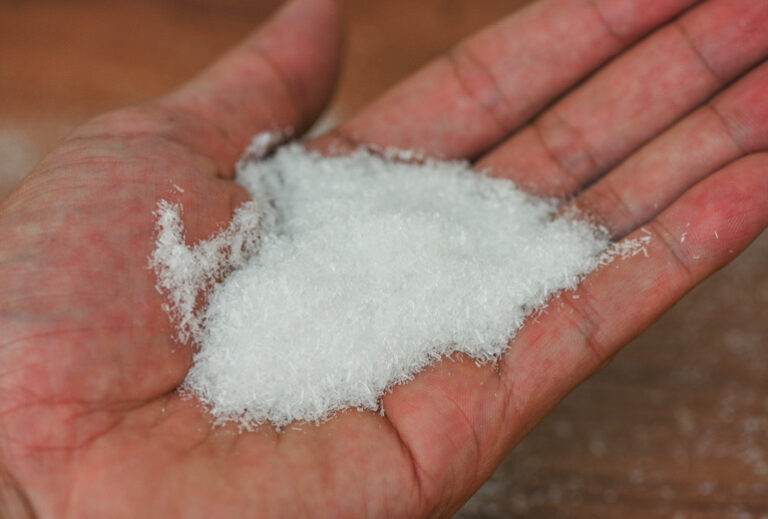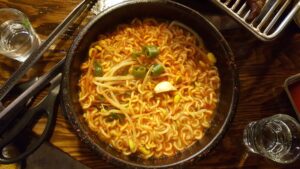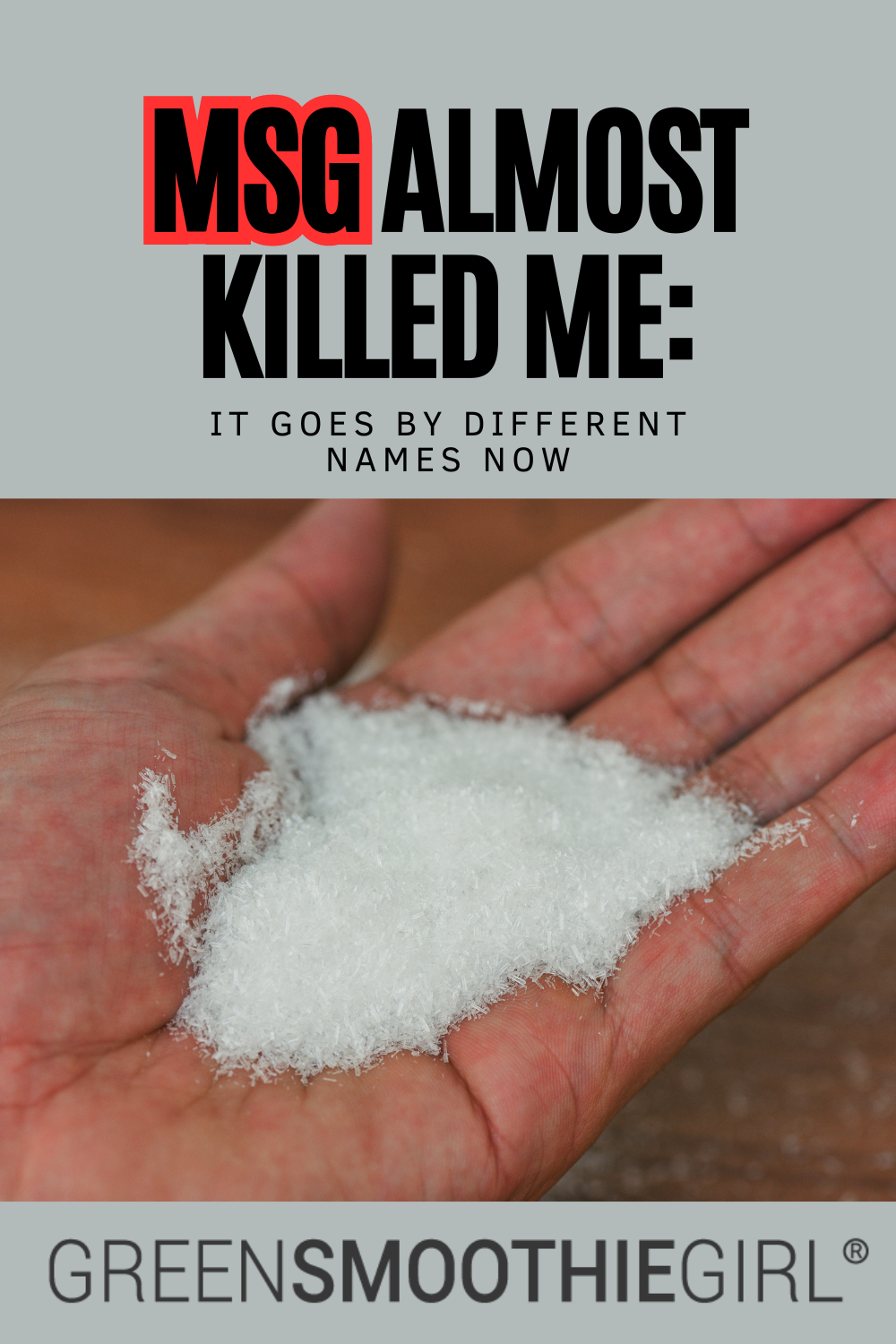MSG Almost Killed Me: It Goes By New Names Now

I have a crazy monosodium glutamate (MSG) personal story.
It was so startling that it led me to this career as a health and wellness author and journalist.
(Don't want to read? Scroll down to see a video instead.)
My Crazy MSG Story
My first mother-in-law cooked the “standard American diet” for her large family.
She had this ranch dip and dressing I called “crack.”
It made me unable to stop eating vegetables and salad – if it was dipped in that stuff.
So, I asked her for the recipe. The dip calls for seven seasonings added to a tub of sour cream. For the dressing, you add the same seven seasonings to half buttermilk and half mayo.
Six ingredients are no big deal: salt, pepper, garlic and onion powders, chives, and parsley.
But the seventh one was Accent, which turned out to be the “crack!” I asked my MIL, “What is Accent?”
She didn’t know, but she showed me the red canister in her cupboard and told me it was cheap and easy to find.
I immediately bought the seven ingredients and made the “Crack Dip” or dressing many times over several years.
My Health Began to Decline: Migraines and Neurological Disease

I started having migraines due to MSG!
During those years, I began to have migraines.
I had many episodes of what I would eventually have diagnosed as TIA, or trans-ischemic attacks, which are mini-strokes. My right arm would go numb, and I couldn’t see or speak for hours.
I knew at the first symptom that I had about 10 minutes to get someone to watch my two little children. And take a prescription painkiller.
The drug and symptoms would cause me to sleep the rest of the day.
In essence, I had neurological disease in my 20s. Had I not interrupted these crazy symptoms in their tracks, I wonder if where I was headed was ALS, Parkinson's, or MS – or death. For sure, I’d be obese.
Neurotoxins Are Addictive and Harmful
I can’t remember where I learned about “neurotoxins.” Specifically, the two worst and most common ones in our food supply:
- Monosodium glutamate (MSG) and
- Aspartame (NutraSweet)
Of course, we wouldn’t be here today if I hadn’t looked at the back of that red bottle of Accent at some point after I’d learned about neurotoxins.
After I’d noticed that after eating that dip or dressing, my joints hurt for a whole week sometimes. And the migraine and other scary stuff happened.
So I looked at the back of that red canister to find that it was pure monosodium glutamate.
Last weekend, I Googled, having not purchased that product in half of my life, nor even been on that aisle of the store often–
–only to find that Accent is still sold to the American consumer as a flavor enhancer.
That’s how Doritos could accurately claim, “Betcha can’t eat just one!”
You pretty much can’t. (Eat just one.) They’ve made sure of it.
The parent company (currently Doritos is owned by Frito-Lay, which is, in turn, owned by PepsiCo) – ran focus groups to find out what the “sweet spot” was–
–How much monosodium glutamate should be added to Doritos to get people to eat the maximum amount?
MSG can make wretched food products taste incredibly good. It’s a neurotoxin, and also called an “excitotoxin,” as it “excites” the nervous system (while also poisoning it).
Aspartame is the same thing (look up the ingredients of Diet Coke and Pepsi – how did they make it taste good?).
[Related: Aspartame – What Is It Doing to You? Are There Safer Sweeteners?]
When I looked Accent up online recently, I found that it is certified by Kosher! I am sad to think that if there are Jewish people who believe that if it’s kosher, it’s good for you–
–it’s not any better for a Jewish human than any other human, even if a rabbi blessed it, and it wasn’t in contact with other foods in the kosher-approval certification protocol.
I vigilantly found sources of MSG in my diet back then and eliminated them. (I also eliminated aspartame.)
Now it’s more complicated.
An Easy Way to Eliminate MSG and Neurotoxins from Your Diet

The first signs of neurological damage began when I was eating a lot of ramen noodles in college.
To help you avoid MSG, we made a card for you.
When you get it, you’ll have all the names food companies call MSG now – simply keep the card in your wallet to consult when you’re shopping!
I had eaten a lot of Top Ramen in college, which is when the first signs of neurological damage began.
Research shows MSG is linked to fibromyalgia, obesity, fatty liver, high insulin and blood sugar, high cholesterol, liver and metabolic issues, high blood pressure, gut-brain axis dysfunction, and damage to the brain and neurological system.
As MSG began to be used widely in the 1960s, the New England Journal of Medicine dubbed it “Chinese Restaurant Syndrome.”
My husband has eaten at Chinese restaurants twice in the last 10 years, and ended up in the fetal position for 24 hours, throwing up a lot. Both times. He claims he will never eat at a Chinese restaurant again.
(It seems to be imported ingredients with MSG added for American Chinese restaurants–it’s not anything to do with how Chinese people cook in China!)
Everyone Needs to Eliminate MSG and Other Harmful Excitotoxins
MSG was probably the major culprit of my mini-strokes because I ate a lot more of it than aspartame.
To this day I avoid both neurotoxins like the plague they are, and:
I haven’t had a migraine, TIA, vertigo, or any of the other scary neurological symptoms I was having, since then. For almost 20 years.
I don’t even have the prescription anymore of the opiate I’d take when a TIA was coming on.
Having to avoid MSG and aspartame has an additional benefit of making most junk food off-limits to me.
It’s not even a temptation. No food is worth having a mini-stroke and having to take hardcore drugs and climb in bed for the day, and be unable to work or show up for my family. I just didn’t know better, till I did.
Did you know? The FDA doesn’t require manufacturers to call an ingredient MSG unless it’s 99% pure!
(What if it’s still super high in “free glutamate,” but not 99%? They just call it something else.)
Byproducts of most of the processed protein people eat in bags and bars are high in free glutamate. Which is pretty sad, because most people think processed protein out of a bag is a staple.
Food manufacturers have gotten clever, and they know many American consumers are on the lookout for MSG to eliminate it from their diet.
So it “hides” on ingredient lists in dozens of different names.
Get our FREE Neurotoxin Wallet Card here. Print it to keep in your wallet, for shopping!
That way, while you’re shopping you can consult the other words MSG goes by on ingredient lists.
Or, for a low price, we’ll send you our laminated Genius Guides, which include the Neurotoxin card. They also include 14 other very useful resources:
Including a wallet card you can consult for the store chains that are selling certain preservative-coated produce, and those who vow they won’t. And much more, to simplify and facilitate your healthy life!
I hope you'll find this neurotoxin resource helpful to keep you feeling your best and staying well.
If you'd like to see this article in video form, here it is:

Disclosure: This post may contain affiliate links that help support the GSG mission without costing you extra. I recommend only companies and products that I use myself.

Posted in: Emotional Health, Health Concerns, Preparedness, Whole Food
















No comments found, but you can be our first!